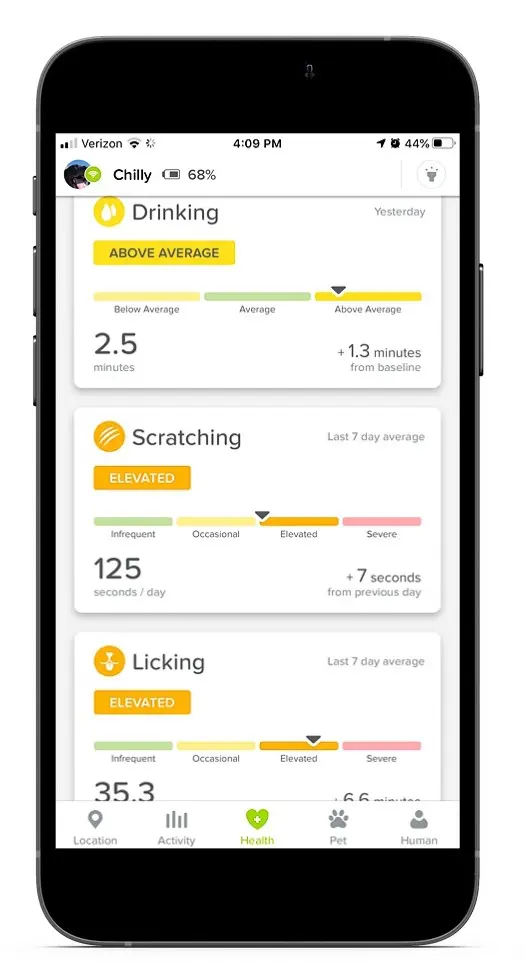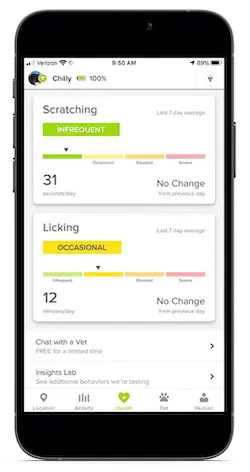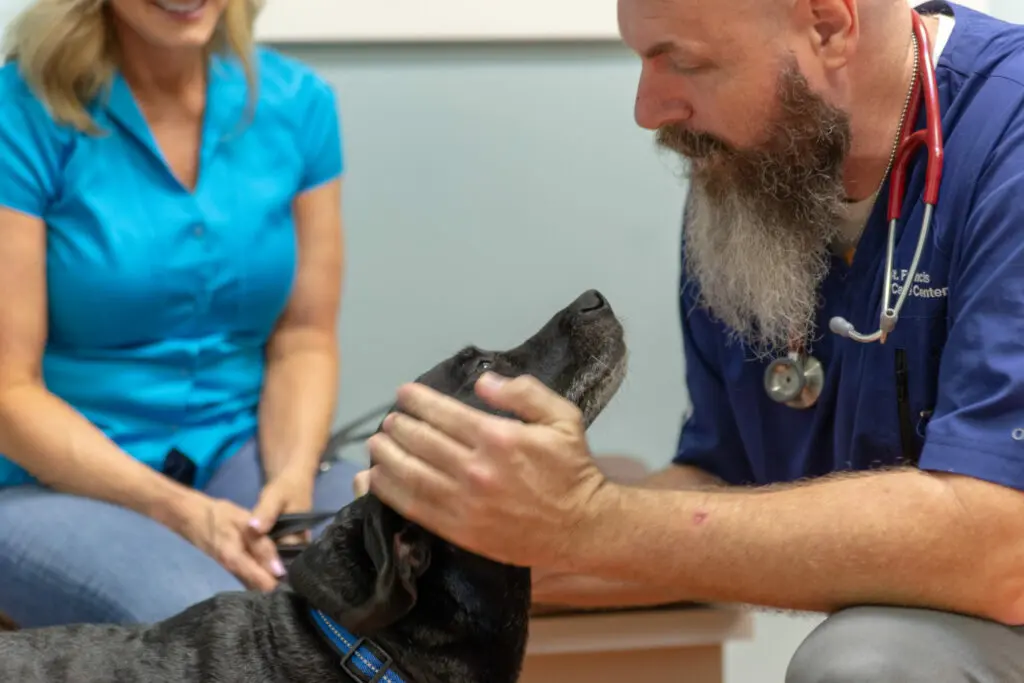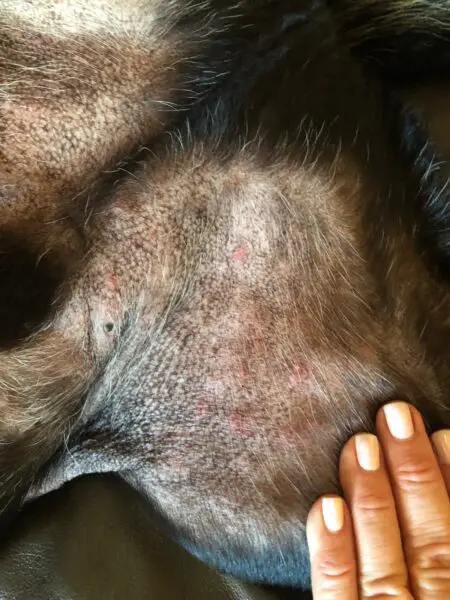
How I Finally Treated My Dog’s Itchy Skin
Does your dog constantly itch, scratch, and bite his skin? Allergies during the spring, summer, and even well into the fall season can cause your dog to become absolutely miserable!

We used to dread allergy season. While all of my dog-loving friends were celebrating by getting outdoors with their pups, we were in protective mode with our dog, Chilly.
When the trees, flowers, and grasses awakened in the springtime, a single romp in the yard for Chilly would typically lead to a nasty skin outbreak – common for the condition called allergic dermatitis – that we’d spend the next 6-8 months trying to get under control.
As a pet parent, how can you tell if your dog has allergies and, more importantly, what can you do to manage your dog’s allergic itch?
How to Recognize Allergy Symptoms in Dogs
As Chilly’s allergic itch progressed, he’d begin to scratch, chew, and bite at his newly-erupted skin which would lead to skin damage and often a secondary bacterial infection. Sometimes he’d lick his feet until red sores developed. His personality would even change. He was less playful and often refused to go outside.
Do you know how to recognize allergic skin disease (allergic dermatitis) symptoms in your dog? It’s not always about the itch!
Common skin allergy symptoms in dogs include:
- Itching, scratching, rubbing, or licking – especially around the face, paws, or underarms
- Hair loss
- Rash
- Red, itchy, scaly, or irritated skin
- Skin infections
- Ear infections or recurrent ear problems (Many dogs shake their heads when their ears bother them.)

Chilly had many of these symptoms, to the point where it was severely affecting his quality of life.
Chilly has a Whistle collar, which tracks not only his location but his health stats. His scratching and licking would elevate to the point where he was spending way too much of his day tending to his itch!
As you can imagine, this led to extreme discomfort for Chilly.
Any exposure to pollen, oak, or ragweed would trigger an outbreak of red, itchy bumps all over his belly and on the inside of his hind legs.
Naturally, this was also stressful for my husband and me. We tried to prevent the outbreak in the first place by walking Chilly on the sidewalk or asphalt to avoid the allergens in the grass.
Then, once back home, we’d wipe him down from head to toe with a wet towel to remove any allergens he’d picked up along the way.
Pin Me!

Invariably, he’d break out anyway. We just couldn’t seem to get ahead of it. Those were challenging times for all three of us. Poor Chilly was miserably uncomfortable, while my husband and I felt guilty that we couldn’t prevent it from occurring, nor could we find a way to manage it long term.
What Is Atopic Dermatitis In Dogs?
People aren’t the only ones who can suffer from allergies. Dogs can have them too, and they can be allergic to many of the same things in the environment that bother people, like trees, grass, and pollen and mold spores. Many dogs are also allergic to dust mites, fleas, insecticides, and even the ingredients in some shampoos.

With people, it can sometimes be hard to tell the difference between allergies and a cold, because respiratory allergies are more common in people. But a dog with allergies won’t be sneezing or blowing his nose – dog allergies usually affect the skin. So depending on what a dog is allergic to, his itching could come and go seasonally, or it could bother him year-round.
Many dogs with itchy skin are diagnosed with atopic dermatitis, which is a chronic, inflammatory skin disease that’s triggered by contact with allergens.
The symptoms of atopic dermatitis may be mild to start with, but they can worsen over time. If you notice any of these symptoms in your dog, you should have a conversation with your veterinarian:
- Itching, scratching, rubbing, or licking – especially around the face, paws, or underarms
- Hair loss
- Rash
- Red, itchy, scaly, or irritated skin
- Skin infections
- Ear infections or recurrent ear problems (Many dogs shake their heads when their ears bother them.)
How I Finally Found Relief for My Dog’s Itchy Skin

In 2017, Chilly was diagnosed with atopic dermatitis by his veterinary dermatologist, Michael Canfield, DVM, DACVD. He said he’d like to try something new to give Chilly some relief from his allergic itch. He explained that one injection of Cytopoint® could provide him with 4-8 weeks of itch relief for his atopic dermatitis.
We had tried other medications in the past and they didn’t work for Chilly’s condition. So naturally, we were eager to see if Cytopoint would work. It did and the result has been completely life-changing for all of us!
Now, even during the height of allergy season, Chilly scratches, bites, and licks far less than he did previously.
In addition, one study showed that after three months of treatment with Cytopoint, 60% fewer associated therapies were prescribed, meaning your dog, like my Chilly, may get more relief with fewer therapies.1
What is Cytopoint?

Cytopoint is an injection your veterinarian gives your dog to provide treatment to control itching caused by allergic or atopic dermatitis. It can start to control the itch within one day of the injection.
With effective control of allergic itch, you’ll see reduced scratching, licking, chewing, and biting of the skin. An injection of Cytopoint typically lasts from 4-8 weeks which allows your dog’s skin, damaged by the itch cycle, time to heal. Subsequent injections are safe and recommended for continued relief and your veterinarian can determine the right schedule based on your dog’s needs and response to treatment.
With Cytopointments, you can even set up scheduling reminders to go to your phone or email so your dog never misses a dose.

How Does the Cytopoint Injection Work?

Dogs with allergic dermatitis have changes in their skin that allow allergens to enter and cause an allergic response. When a dog scratches his itchy skin, that can make the damage even worse. In response to allergens, the body releases proteins that attach to nerves in the skin. Then itch signals are sent to the dog’s brain. He responds by scratching, which creates more skin damage and more opportunities for allergens to penetrate.
Cytopoint works by breaking this itch cycle. It acts like your dog’s own immune system to target and neutralize one of the main proteins that send the itch signals to his brain.
Because the itch signal is blocked, your dog won’t feel the need to scratch, and his damaged skin can begin to heal.
Another thing I like about Cytopoint is that it is a treatment called a monoclonal antibody. That’s a fancy way of saying it’s a protein and not a chemical. And since it’s not a chemical, it won’t put pressure on your dog’s kidneys or liver. This was great news for us since Chilly also has some issues with his kidneys.
How Do I Know When It’s Time for Another Cytopoint Treatment?
Your dog may be able to go as long as eight weeks in between treatments. However, it’s recommended that you schedule an appointment with your veterinarian in four weeks to check your dog’s progress and to help decide when his next injection should be given.

Monitoring your dog during treatment is important, and Cytopoint also offers a convenient downloadable tool that can help you to keep track of your dog’s itching. For the first week, you will rate and record his level of itching every day, and then after that, you rate him once a week.
Having a record of his level of itchiness can help you and your veterinarian gauge how long the injection provides relief and make plans for his future treatments.
If your dog is suffering from allergic itch, it’s important to be his advocate and get him the help he needs to recover and once again enjoy the outdoors.

This post is sponsored by Zoetis Petcare. However, all opinions and anecdotes are my own, and I never promote any products or brands I don’t believe in. ~Petfully yours, Kristen
1 Data on file, Quality of Life Outcomes Research, 2018, Zoetis Inc.







My vet put my dog on cytopoint and he developed bone cancer in his jaw.
Sue,
I’m so sorry to hear about your dog’s cancer. One of my own dogs passed from cancer a couple of years ago, and it’s heartbreaking to see them suffer. Please remember every dog reacts differently to medications. While my dog and many others have responded really well to this medication, it’s really important to discuss any and all concerns regarding your dog’s medication with your vet. I don’t provide medical advice, simply my own experience. I’m not aware of any causation regarding cancer and this medication. That said, I’m aware that dogs that have cancer often have other signs that show up before the cancer is found. I wish the best for you both and that you and your vet find an effective treatment plan.
Kristen
My vet has suggested Cytopoint but didn’t explain how it worked. Thank you for your detailed explanation.